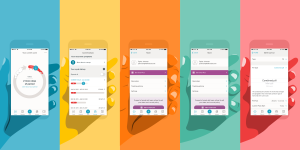Photo by Emma Günther
5 unexpected benefits of period tracking

Understanding your period can tell you more about yourself than you might imagine. Here are Clue Chairwoman and co-founder Ida Tin's 5 reasons to track your period:
1. It can help you understand your unique patterns.
The simplest way to track your cycle is to log when your period occurs so you can start to understand your average cycle length. Every body is different, and having an unpredictable period is more common than you think. A 28-day cycle is a global average, but may not be your personal average. If you are aware of your cycle, you will naturally feel more in control–and less likely to be surprised by your next period. In the Clue app, you also get detailed analysis of your cycle history.
2. You'll know around when you ovulate.
There are common misconceptions about how pregnancy occurs: that you can only get pregnant on your day of ovulation, or that you can get pregnant all the time. Neither of these are true. During the days leading up to and after ovulation, pregnancy is possible. If you want to use Clue to become pregnant, the predicted ovulation day can serve as a way for you to get a better understanding of your fertility. The Ovulation Day is still an approximation, as your specific day of ovulation is very difficult to predict. Your peak fertility will vary even if you have predictable cycles. If you’re interested in following your ovulation, make sure you have the Ovulation Day switched on in the Clue app.
3. It will increase your awareness of your overall health and wellness.
Your menstrual cycle is a direct indicator of your overall health, and periods are your body's way of telling you that things are working as they should. Having an extremely unpredictable or heavy period, or skipping a period, can indicate an existing underlying condition. By tracking and logging various details of your cycle, you will be able to recall things that you might otherwise forget when speaking with your healthcare provider. When you use Clue, you always have the dates of your last period at your fingertips.
4. It can tell you a lot about your individual sex drive.
Tracking your sex drive and sexual activity can help determine patterns in your cycle. Around ovulation, you might notice spikes in your sexual desire. Sex is healthy, so being aware of your sexual activity by tracking in Clue is a fun way to know when you might feel the most desire (or not).
5. You can understand and manage your mood.
It's not just about PMS. Hormonal changes throughout the menstrual cycle have been suggested to cause changes in mood like irritability, anxiety, or feeling more affectionate, but a definitive link between mood and the menstrual cycle is still under study and debate. Learning when these changes happen can be another piece of information to help understand the rhythm of your cycle.
In Clue, you can track when you feel productive, happy, sad, exhausted—the many emotions and mental states all people experience, even beyond PMS. Being aware of changes helps you prepare for them and better manage them.

This article was updated on March 17, 2021.
